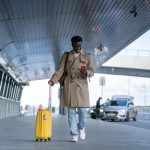If you’re of African descent (especially a Black American) thinking about moving to Ghana, the “Right of Abode” (ROA) program could be your golden ticket. It’s a special legal status that lets eligible people live and work in Ghana indefinitely. In practice, ROA functions like permanent residency for the diaspora – holders can stay in Ghana forever, enter visa-free, and work without needing a permit. It is not full citizenship (so no voting rights or passport immediately – you want naturalization for that) but it is a major step toward making Ghana your home.
What is the Right of Abode?
Right of Abode is a legal status created by Ghana’s Immigration Act (2000) that grants qualified individuals indefinite residence in Ghana. Essentially, it means you can “remain indefinitely in Ghana” and “enter Ghana without a visa”. Think of it as Ghana’s version of a green card specifically for the African diaspora. It is granted by approval of the President (through the Interior Minister) and comes with an ID card rather than a passport. Importantly, ROA holders do not automatically become Ghanaian citizens; they simply have the right to live and work there. According to Ghana’s law, a person with ROA status may “work in Ghana either as self-employed or as an employee without a work permit”, and can sponsor dependents. This means once approved, you can build a life in Ghana almost exactly like a citizen, except for national voting and holding public office.
Legal status is only one part of moving to Ghana. Daily realities like housing, banking, healthcare, and cultural adjustment often matter just as much. Our eBook:
250 Things to Know Before Moving to Ghana covers the practical details most official guides do not.
It is especially helpful for first-time movers who want fewer surprises.
Who Qualifies for Right of Abode?
Ghana’s law allows two main groups to apply for ROA:
- Former Ghanaian nationals: Anyone who was Ghanaian by birth, descent, or naturalization but lost Ghanaian citizenship after becoming a citizen of another country. (For example, if your parents or grandparents were Ghanaian and you once held Ghanaian citizenship, you qualify under this category.)
- Persons of African descent in the diaspora: This is key for Black Americans and the wider African diaspora. Ghana’s Act explicitly says “a person of African descent in the Diaspora” can be granted ROA. In other words, if you can prove your African ancestry or heritage, you are eligible.
Applicants must meet certain conditions. You have to be at least 18 years old and of good character. Specifically, you need two Ghanaian citizens (notaries, lawyers, senior officers or similar) to attest to your character. You must have no serious criminal record (no prison sentence of 12+ months). You should show independent means (financial stability) to support yourself, and the government must believe you can make a substantial contribution to Ghana’s development. In practice, this might include having skills, education, investment plans, or business ideas that would benefit Ghana’s economy. In short, Ghana is looking for honest, capable individuals of African heritage who can contribute positively to the country.
Legal Background and Policy Intention
ROA is part of Ghana’s broader effort to welcome the African diaspora “home.” The concept dates back to Ghana’s Immigration Act of 2000 (Act 573), which reflected Ghana’s Pan-African vision. As Ghana’s Parliament noted, the law intended to “bring home sons and daughters of Africa” by allowing any person of African descent to settle in Ghana. In recent years this vision has been energized by initiatives like the 2019 Year of Return (commemorating 400 years since the first enslaved Africans arrived in America) and the ongoing “Beyond the Return” campaign. These programs actively invite African Americans and others of African ancestry to visit, invest, or move to Ghana.
Indeed, Ghana has already seen hundreds of African Americans and other diasporans taking up residence or citizenship. For example, news outlets report that 524 people from the Black diaspora – mostly Black Americans – were granted Ghanaian citizenship in late 2024, the largest single group since the Year of Return. Ghana’s Tourism and Diaspora Affairs offices even extended those efforts under “Beyond the Return,” welcoming diasporans from the U.S., Canada, UK, Jamaica and beyond. Right of Abode is one concrete outcome of this policy: by offering a fast track to permanent residence, Ghana is making it easier for African Americans and other people of African heritage to “come home” and contribute to Ghana’s development.
Benefits of the Right of Abode
Holding ROA status comes with several major perks for diaspora returnees. In practice, it provides nearly all the benefits of Ghanaian permanent residency:
- Indefinite, visa-free stay: You can live in Ghana for as long as you want without renewing any visas. ROA holders are “entitled to remain indefinitely in Ghana” and may enter and exit without needing a visa.
- Work and business rights: You can work or start a business freely. The law explicitly states ROA holders may “work in Ghana either as self-employed or as an employee without a work permit”. This means no more applying for regular work permits or business permits – you already have the right to work.
- Education and services: You can enroll in schools, access health care and banking, and buy property under the same conditions as any permanent resident. (Note: there are some restrictions on foreigners buying agricultural land in Ghana, but many diaspora returnees do purchase residential or commercial property.)
- Family reunion: Your spouse and minor children can join you. Ghana’s immigration rules allow a non-Ghanaian spouse/child of a ROA holder to get a dependent permit. This helps families settle together.
- Path to citizenship: ROA can be a stepping stone. After a number of years in Ghana, you are in a strong position to apply for full naturalization (especially if you meet standard requirements). In fact, guides note that ROA holders who live in Ghana long-term can pursue citizenship when eligible. This means you’re on track for a Ghanaian passport later if you choose.
Overall, ROA gives you the same practical rights as a Ghanaian permanent resident, minus political rights like voting or running for office. It’s designed to make Ghana feel like home, without requiring immediate citizenship.
Application Steps
1. Prepare your application. You will need to submit a formal letter to Ghana’s Minister of the Interior requesting the Right of Abode. In practice, applicants usually address the letter to the Interior Minister (for example, “Hon. Minister, Ministry of Interior, P.O. Box M42, Accra, Ghana”). Along with your letter, gather key documents:
- Proof of identity and age: Passport bio-data page and birth certificate.
- Proof of African descent: This is not always strictly defined, but you may include family trees, ancestral info, or any evidence of your African heritage.
- Criminal record check: A police clearance certificate from your country of current residence (showing no serious convictions) helps satisfy the good-character requirement.
- Financial means: Bank statements, employment letters, or other evidence that you can support yourself. The law expects ROA applicants to have “independent means”.
- Character references: Two letters attesting to your character, signed by Ghanaian citizens of good standing (for example, lawyers, notaries, or senior public officers). This is specifically required by the law.
Include any other supporting documents that strengthen your case (education diplomas, CV, community involvement, etc.). The goal is to show you meet the criteria listed under the Immigration Act.
2. Submit your application. Send your package to the Ghana Immigration Service/Ministry of Interior in Accra. If you are abroad, you can mail it via a Ghanaian consulate or an embassy (though there’s no dedicated ROA online form). Many applicants plan a trip to Ghana to hand-deliver or consult with immigration officials. Once received, the Ghana Immigration Service will conduct due diligence and make a recommendation to the Interior Minister and President. According to official sources, this process typically takes about six months once your complete application is in their hands. Be prepared to provide any extra information if requested.
3. Wait for approval. If approved by the President, you will be granted ROA status. You will receive an official ID card reflecting your right to live and work in Ghana indefinitely. (Your non-Ghanaian passport is stamped or noted accordingly.) The status does not expire – you keep it for life – although you may need to renew the physical ID card periodically. After that, you can move to Ghana (if not already there) and start your new life.
Right of Abode Vs NaturaliztionVs Touist Visa
Right of Abode, naturalization, and a tourist visa each serve very different purposes in Ghana’s immigration system. A tourist visa allows only short-term visits and does not permit work or long-term residence. Right of Abode grants permanent residence and the right to work in Ghana but does not provide citizenship or political rights. Naturalization (this is best) is the only path that leads to full Ghanaian citizenship, including a passport and voting rights, but it also requires the longest time and the highest level of commitment.
| Status | Right of Abode (ROA) | Naturalization | Tourist Visa |
|---|---|---|---|
| Purpose | Permanent residence for eligible diaspora and former Ghanaians | Full Ghanaian citizenship | Short-term visit only |
| Who It Is For | People of African descent in the diaspora or former Ghanaian citizens | Foreign nationals who meet long-term residency and integration requirements | Visitors, tourists, family visits, or short stays |
| Length of Stay | Indefinite | Indefinite | Typically 30–90 days per entry |
| Right to Work | Yes, no work permit required | Yes, full citizen rights | No |
| Visa Required to Enter Ghana | No | No | Yes |
| Renewals Needed | No periodic renewal once granted | No | Yes, must renew or exit |
| Ghanaian Passport | No | Yes | No |
| Voting Rights | No | Yes | No |
| Eligibility Complexity | Moderate | High | Low |
| Typical Timeline | Several months, varies by case | Many years of residency before eligibility | Days to weeks |
| Best For | Long-term relocation without seeking full citizenship | Those who want full legal and political integration | Short visits or testing life in Ghana |
Fees and Processing (2026 Update)
Ghana charges a government fee to apply for Right of Abode. As of 2025, the published fee schedule shows GH₵1,940 (use our currency converter for USD) for an ROA application for those with Ghanaian or African connections (while applicants without such connections may pay a higher GH₵3,879 fee). This is a one-time fee payable when you submit your forms. In addition, you might have small costs for certified documents, notarizations, or express mail. The Interior Ministry’s website notes that processing typically takes about six months after the Immigration Service completes its checks. (This roughly aligns with experiences of other diasporans.) Keep in mind that these fees and timelines can change, so it’s wise to check the latest information on the Ghana Immigration Service website or with the Ghanaian embassy.
ROA vs. Citizenship or Permanent Residency
It’s important to distinguish ROA from full Ghanaian citizenship or a regular permanent residence.
- Citizenship (Passport): Becoming a Ghanaian citizen means holding a Ghanaian passport and enjoying full political rights (voting, running for office, etc.). Naturalization is handled under the Citizenship Act. For most foreigners, naturalization requires several years of residence and integration – typically at least 5 of the last 7 years lived in Ghana, language ability, good character, etc.. The process also has its own fees (Naturalization Form 5 costs GH₵7,758 as of 2025). In contrast, ROA does not give you a passport or voting rights. However, Ghana allows dual nationality, so if you do later become a Ghanaian citizen, you can keep your U.S. citizenship as well.
- Permanent Residence (Indefinite Permit): Ghana has a general indefinite residence permit system for other cases (spouses of Ghanaians, long-term investors, etc.). These permits grant rights very similar to ROA – indefinite stay and work without needing renewal. The big difference is eligibility criteria. Indefinite permits for spouses might require marriage to a Ghanaian, and for others it requires long-term prior residence. By contrast, ROA was created specifically for diaspora Africans and former Ghanaians, with its own eligibility rules. In effect, once granted, a Right of Abode is legally on par with any other indefinite residence – Ghana’s law explicitly groups them together, giving both the same rights (stay, visa-free entry, work).
- Right of Abode (“Diaspora Residency”): ROA is essentially a permanent residency for people of African heritage. Think of it as a special PR card. As one guide puts it, ROA holders live in Ghana “without renewing permits – essentially equivalent to a ‘Green Card’”. The official status doesn’t expire. The only downside compared to citizenship is that you can’t hold a Ghanaian passport or vote while on ROA. But you can always apply for naturalization later, if and when you meet the requirements.
In summary, ROA is your fast track to living in Ghana indefinitely, whereas citizenship is the full legal membership (with higher barriers). Both paths benefit from Ghana’s acceptance of dual nationality, so you won’t have to give up your U.S. citizenship in the process.
Common Questions
- Can I apply while living in the U.S. (abroad)? There is no online application portal for ROA, so most people apply by sending documents to Ghana. You can prepare everything from home and mail or hand-deliver it to Ghana’s Interior Ministry (or through a Ghana consulate). Some organizations recommend traveling to Ghana and applying in person at the Immigration Service in Accra for a smoother process. In any case, you’ll need to communicate with Ghanaian officials (via the embassy or directly) to get started.
- Do I lose my U.S. citizenship if I get ROA or become Ghanaian? No. Right of Abode itself is not citizenship and does not affect your U.S. nationality. Even if you later choose to naturalize as a Ghanaian, Ghana permits dual citizenship. The U.S. also allows dual citizenship, so you can legally hold both passports. You would only lose U.S. citizenship if you voluntarily and explicitly renounce it, which most people do not need to do for Ghana.
- Is ROA the same as dual nationality? Not quite. ROA is a residency status, not a nationality status. It does not grant you a Ghanaian passport or citizenship. However, it does allow you to live and work in Ghana long-term as if you were a citizen. If you want a Ghanaian passport later, you’d go through the standard citizenship application. Rest assured, Ghana allows you to become a dual national, so obtaining Ghanaian citizenship won’t force you to give up your U.S. passport.
- Any other tips? When applying, be thorough and patient. Ghanaian authorities are keen to welcome diaspora applicants, but bureaucratic processes take time. Engage Ghanaian friends or contacts if possible to help gather references. Consider reaching out to the Office of Diaspora Affairs or reputable diaspora advocacy groups for guidance. And once you arrive in Ghana, enjoy the culture, make local connections, and let the warmth of Ghana’s communities show you why it’s called the “homecoming” for many African Americans.
Ghana’s Right of Abode is a unique opportunity for people of African descent to make Ghana their home, work freely, and build a future on African soil. By understanding the requirements and steps above, you’ll be well on your way to reconnecting with your roots in Ghana. Good luck on your journey – Akwaaba (welcome) home!
Sources: Official Ghanaian laws and government guidelines, Ghana Immigration Service fee schedule, and recent news on Ghana’s diaspora programs.



